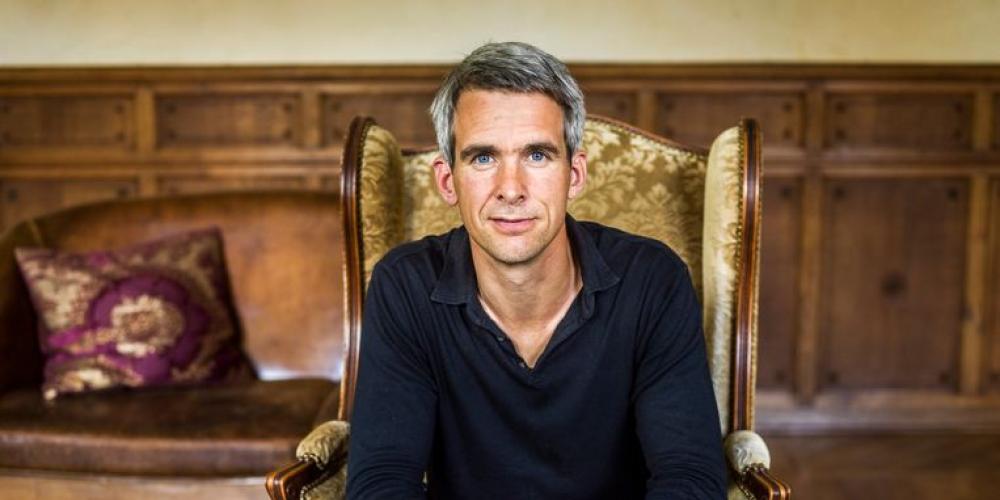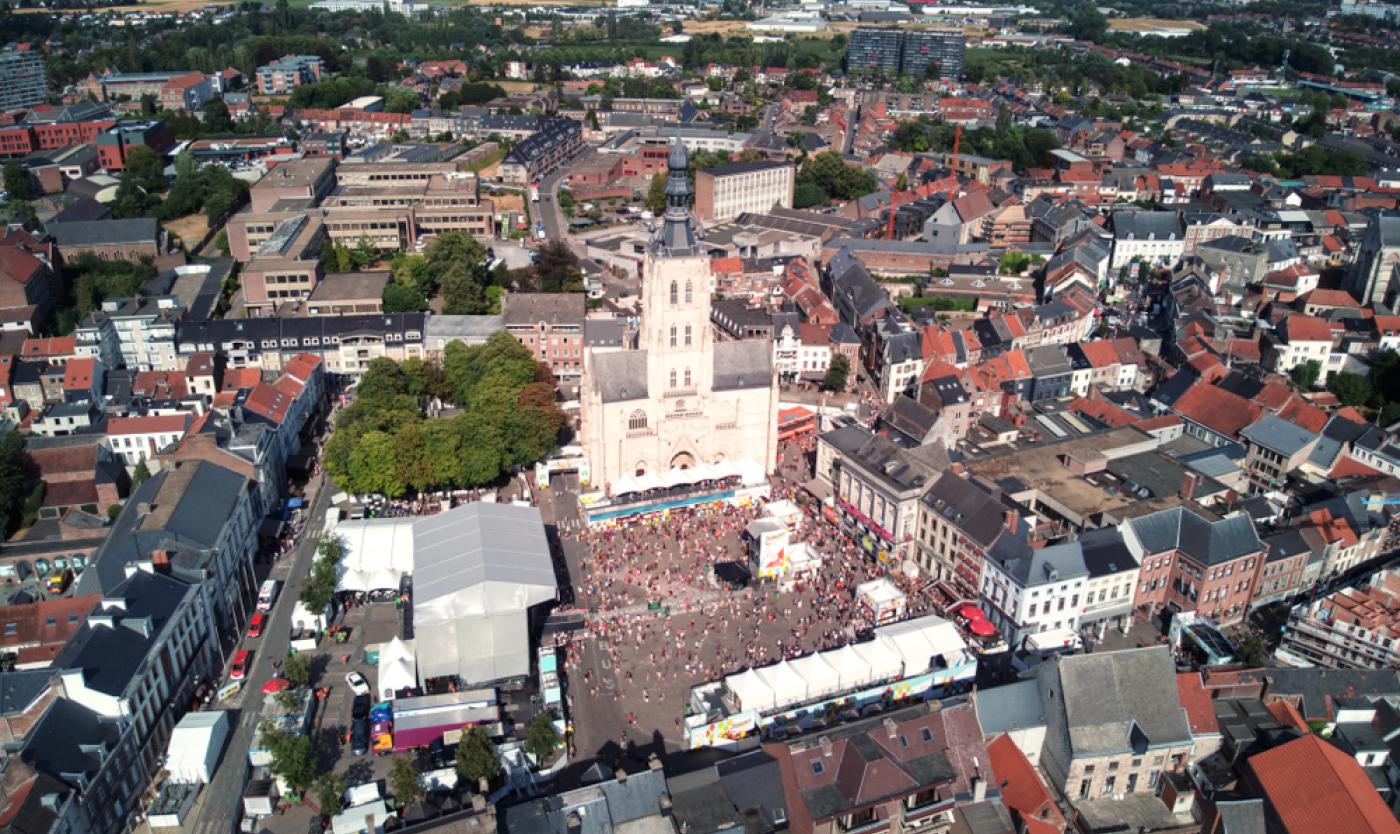
On 1 December, Jonathan Holslag will swap academia for the mayoralty. The political scientist, who has tirelessly criticised European policymakers for their China policy, will now have to prove himself in his home city of Tienen. However, he doesn't see this as such a big leap. "Geopolitics and local politics are interconnected: international phenomena have a significant impact on the village street." Together with the professor, we look back and forward.
The VUB traditionally has many first-generation students—young people who are the first in their family to pursue higher education. You were one of them.
Jonathan Holslag: "And I came from technical education, ‘thanks’ to the infamous fall-back system. In my teenage mind, there wasn’t much room for school back then."
How high was the university threshold for you?
"I studied political science and international relations through a shortened programme. But before that, I had already started training as a non-commissioned officer and taken a teaching course, plus I had taught in secondary schools for a few years. So, I was prepared. What helped was that we had lessons in small groups, and were close to the professors and assistants. I really enjoyed and benefited from that small scale. During or after classes, we could exchange ideas with political scientists like Gustaaf Geeraerts and Patrick Stouthuysen, and with historian Machteld De Metsenaere—I’ve always found history a fascinating subject. This proximity made it easier to raise the bar and later continue on an academic track. In my final year, I co-wrote a book on China with Gustaaf Geeraerts: Power or Myth. That’s how the ball started rolling."
Since then, student groups have become larger.
"The small scale I knew as a student and early professor is no longer there. As a university, I think you owe it to yourself to communicate this honestly and transparently. In a large group, it’s less obvious to guide students in a personal way, especially now that the student population is becoming more diverse. This applies not only to universities, but to society as a whole: if you want to offer opportunities to young people with disadvantages, you must engage with them personally and be able to think along with them."
"Perhaps a new political culture in Tienen could also inspire research at the VUB"
In a column, you pointed an accusing finger at the funding model for university education.
"That model needs to be reformed; it’s completely unsustainable. It forces universities into a race to the bottom. They compete with each other to attract more and more students, and they push their faculties and programmes to scale up and grow. When student numbers rise, you almost have no choice but to switch to lecture-based teaching, with exams that assess knowledge reproduction via standard or multiple-choice questions. Personally guiding students, encouraging debate, simulating negotiations, assigning essays, or visiting an embassy together—that’s only possible in smaller groups. This approach also aligns with the philosophy of the VUB, with the mission that always attracted me to our alma mater: the humanistic mindset, critical thinking, focusing on the person with all their challenges and talents... That mission is incredibly valuable, but we’ll all have to fight harder to secure the necessary resources for it."
It’s noticeable: you still refer to ‘we’ when talking about the VUB.
"I remain involved, even if it’s just to continue following our young researchers and to give a few lectures for my successor Koert Debeuf. I’ll certainly continue to cherish my connection to the VUB. And who knows, maybe the new political culture we aim to introduce in Tienen will later inspire new research at the VUB."

The Grand Place of Tienen, where Mayor Holslag will have his office.
"In the past twelve months, I have learned more about domestic politics than I did in the previous twelve years as a university professor"
As Mayor of Tienen, will you still follow world politics?
"Definitely, and I’ll continue to write my columns as well. Geopolitics and local politics are intertwined: international phenomena have a huge impact on the village street. The economic power politics cause real problems for several businesses in Tienen. For instance, the city has a large citric acid producer, which wants to focus on innovation, sustainability, and circularity. But those plans are thwarted because the company has been undercut by Chinese competitors for years. Such a case makes my academic work feel very concrete. Climate change is another global issue with local consequences. Tienen lies in Flanders’ most fertile agricultural region, but the unpredictable climate—with extreme droughts and heavy rainfalls—damages crops and soil."
The increasing diversity also relates to international trends.
"During the Flemish elections, Vlaams Belang was the largest party in Tienen, and according to the municipal monitor, 41% of residents believe there are too many foreigners living in the city. That’s a pretty telling signal. It means we must push harder for integration and community-building. The goal must be to sharpen a shared future for everyone, despite all the different backgrounds."
Think global, act local?
"I do think that’s true. If you want to improve the world, you have to start locally, very concretely."
Does a mayor have enough levers to address supra-local problems?
"One starts to wonder who actually has the levers to do that. Flanders, Belgium, Europe: everyone is powerless, watching from the sidelines. And even when they do have levers, they don’t always use them. As a local politician, you have no impact on Chinese dumping practices. But I do know some people to continue applying pressure at the European level."
Local politicians say they need party colleagues in Brussels to secure funding for their city or municipality. In your party, only the list-puller had connections. Will you be left high and dry?
"It certainly helps to have contacts, there’s no denying that. But I think subsidies mainly depend on strong local governance and good subsidy applications, which you’ve thoroughly prepared together with the administration."
Will you complete these six years, or is the mayor’s office just a stepping stone to a higher political mandate?
(laughs) "I get asked that question a few times every day. If we want to give democracy a boost, we have to keep our promises to the voters. I’ve committed to working for the city for six years, and that’s exactly what I’m going to do."
What can a mayor learn from a professor?
"The broad perspective. The long-term horizon. The ability to look at your municipality or city with an autonomous view, to keep a critical eye on things, and to ask the questions that truly matter."
And what can a professor learn from a mayor?
"It might be a bit blunt, but in the past twelve months, I’ve learned more about domestic politics than I did in the previous twelve years as a university professor."
"A mussel dinner can actually be quite fun. But everything in moderation."
What’s the biggest lesson?
"The importance of proximity and patience. Everything that’s important in our democracy takes an incredible amount of time. As a politician, it’s not enough to cut ribbons. The job requires that you genuinely listen to each other, take people’s concerns seriously, and provide honest answers. The differences between local and global politics have also become clearer to me. Geopolitics is like a billiard table, with states bouncing off each other. Local politics, however, is a fluid mass where so much depends on the personal relationships between people. Academic research uses all sorts of clever models, but I suspect you can really grasp these sensitivities only when you're right in the middle of the political action."
Research work is a solitary activity, but a mayor must get among the people. Are you the type to attend all the mussel dinners?
"A mussel dinner can be quite fun, actually. But everything in moderation. I’ll definitely make time to listen to the people of Tienen. Now that I’m no longer at the VUB, that’ll be a bit easier to manage."
What feeling predominates now that you’re leaving?
"Definitely concern about the world, our education system, and our students. I believe tough times are ahead, and I’m not sure we’re adequately preparing our young people for that. This isn’t criticism for the sake of criticism, nor is it doom-mongering, but I’m genuinely worried about the state of Flemish education. Perhaps too worried. That’s the hardest part about leaving: we need to adjust the education system, and I won’t be able to contribute to that anymore. But I’m someone who doesn’t shy away from challenges or give up when things get tough. I’ve had a great time at the VUB over the past twenty years, and I’m grateful for that. But now, my main feeling is genuine concern. My commitment to the VUB’s mission makes it hard to step back from my engagement."
Is this really goodbye, or could it be "see you later? "I’m not ruling out a return; otherwise, I would have just resigned. I’ve agreed with the university that I’ll work for Tienen for six years. Maybe I’ll come back after that, completely recharged, with lots of valuable insights and experiences. No one knows where they’ll be in six years. In any case, I will always take responsibility in the public debate and for the next generations."